As part of Carnegie Council's Global Ethical Dialogues site visits to eight countries around the world, the Council in June 2015 led a team of researchers, fellows, faculty, and students to conduct interviews in Japan on the ethical implications of the 2011 Fukushima nuclear accident. Now in its third year, this project will use the findings of these visits to produce a book on a global ethic and local moral contentions, authored by the Council's Centennial Chair Michael Ignatieff, who also teaches at the Harvard Kennedy School.
In Japan, the team spent two weeks conducting conversations with experts, activists, and officials, including former Prime Minister Naoto Kan, in Tokyo, and with a variety of residents, volunteers, business owners, and officials in Fukushima Prefecture. The trip to towns in Fukushima, including Minamisoma and Namie, which is now a ghost town in the evacuated zone, was in collaboration with Bridge for Fukushima, a Japanese nonprofit that facilitates dialogues between the prefecture and the world since the nuclear accident.
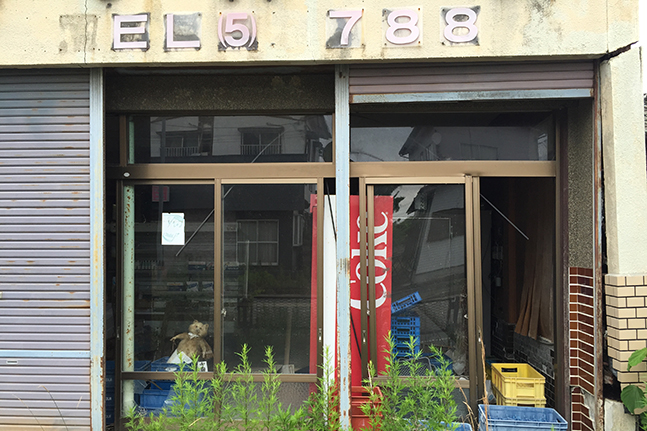
Photo: Devin T. Stewart. An abandoned building with stuffed animal left behind after the earthquake in Fukushima, Japan.
The trip to Japan was made possible by support from the Japan ICU Foundation, the RJ Myers Fellows Fund, and other donors. The Council also is grateful for the invaluable collaboration of Carnegie Council Global Ethics Fellows in Japan, Katsuhiko Mori of International Christian University, Hatsue Shinohara of Waseda University, and Madoka Futamura of Hosei University, as well as from the Council's senior fellow Malka Older and Ethics Fellow for the Future Honami Iizuka of ICU.
I am particularly thankful for the long-term vision of collaborators Prof. Mori of ICU and Paul Hastings of Japan ICU Foundation. Several Carnegie Council Global Ethics Fellows participated in the dialogues in Japan, playing crucial roles as cultural interlocutors. Traveling from all parts of the world to create a truly global dialogue, participating fellows included Jean-Marc Coicaud, Emiliano Buis, Yitzhak Benbaji, Helle Porsdam, Bartlomiej Nowak, and Deen Chatterjee.
Since the March 2011 earthquake, tsunami, and nuclear accident, moral arguments about the future of nuclear power in Japan have become one of the nation's most galvanizing and sensitive topics. Nevertheless, the many people we met opened up to us to tell us their stories and share their opinions, despite the difficult memories it must have evoked. The Japanese virtues of perseverance and hospitality were clearly on display during our stay. For that we are very grateful.
Below are some reflections and images from members of our delegation.
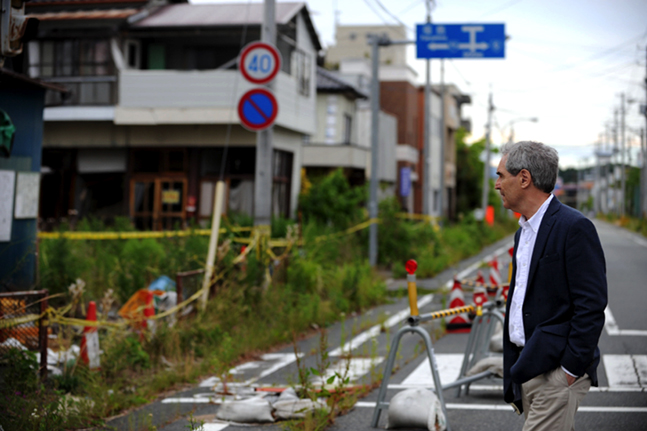
Photo: Allison Kwesell. Michael Ignatieff examines damage in Fukushima, Japan.
Michael Ignatieff, Uehiro Chair for the Carnegie Council Centennial:
With a team from the Carnegie Council on Ethics in International Affairs, I went to Japan, four years after the disaster, to learn from people in (Fukushima Prefecture, Tokyo, and elsewhere) who had lived through the unimaginable. What had it done to their thinking about the ethics of risk? Having lived through a nuclear meltdown, did they think that the risks of climate change still justified running the risks of nuclear? What impact did their traumatic experience have upon their ethics of trust? Did it reinforce or weaken their faith in government, science, and expertise? Finally, what had survivors of the disaster learned about their own capacities for resilience?
To be resilient is to believe that, no matter how tough the present may be, the future is bound to get better. Does this just mean a future for you? Or does it also mean a future for others, for the society of which you are a part? Resilience is both personal and social, an attribute that some individuals have and others have less of, but that can be strengthened if institutions, organizations, together with forms of community provide people with a sense that there is a future that can be reached together. If it's a social virtue, then the question becomes how to help communities, organizations, and institutions do a better job helping individuals become more resilient when disaster strikes.
Resilience is mysterious. Some think they have it, but when plunged into the unimaginable situation, they fall apart. Others think they are frail and then surprise themselves when catastrophe strikes. Experiences of the unimaginable—like Fukushima—are both fascinating and troubling because anyone like me arriving from outside is bound to ask, sooner or later, whether we'd have what it takes to survive.
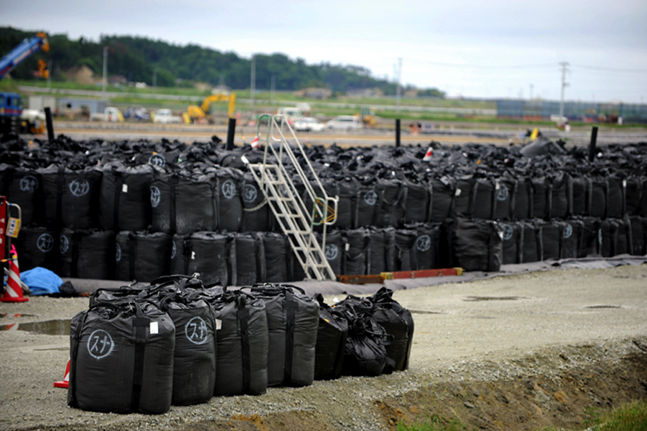
Photo: Allison Kwesell. Bags of radiated top soil being collected.
Resilience is a strange, mostly untapped inner resource in most human beings: it is tacit, bodily, physical, beyond words, instinctual, yet at the same time metaphysical, implying a consciously positive orientation towards time and what the future holds for ourselves and more generally for us as human beings. There are social and political preconditions for resilient responses: in democracies, the confidence that political authorities will keep you safe; in societies that aren't democracies or where order has been compromised, the belief that you are not entirely on your own, that there are claims you can make on people around you that will help you to make it through. All of this—instinctual, metaphysical, political—creates the confidence to believe, when disaster has you in its clutches, that if you survive today, you'll be able to survive tomorrow.
Paul Hastings, Vice President, Japan ICU Foundation:
On the evening of March 10, 2011 the Japan ICU Foundation hosted a festive dinner in New York City for alumni and friends of International Christian University (ICU). In attendance was a delegation from ICU led by President Norihiko Suzuki, in town for a bi-annual meeting of the Japan ICU Foundation's board of trustees. A jetlagged President Suzuki woke in the predawn hours of March 11 to a series of urgent messages from colleagues and family in Tokyo. A massive earthquake had struck off the coast of the Tohoku region in northeastern Japan.
Later that morning as the staff and trustees of the Japan ICU Foundation gathered with our colleagues from Japan, a live stream from NHK was projected onto the meeting room screen. Video showed the tsunami slamming into the coast, leaving a trail of massive destruction in its wake. Damage and loss of life from the tsunami was vast and heartbreaking, and only later in the day did reports begin to surface of the unfolding disaster at the Fukushima Daiichi nuclear power plant. The next several days and weeks were a defining moment in Japan's history. Not since WWII had Japan faced such a catastrophic loss of life and property, nor such uncertainty about its future. If the nuclear meltdown had not been contained by the heroic efforts of selfless plant workers, Tokyo and our beloved ICU campus would have faced mandatory evacuations. The fate of our university hung in the balance.
ICU was founded as the horrors of WWII were ending as a project of reconciliation between Japan and the United States, and has ever since aimed to educate globally minded students committed to human rights. Similarly, the Carnegie Council for Ethics in International Affairs was founded with a mission to support reconciliation and peace. Given these common roots, the collaboration between the Carnegie Council, ICU, and the Japan ICU Foundation, which culminated in the Global Ethics Conference held on the ICU campus in June 2015, developed organically over several years. In addition, given our mutual interest in reconciliation and ethics, the conference theme of "Global Ethics: Nuclear Energy, Technology and Risk," was highly appropriate.
It has been a pleasure working with Devin Stewart at the Carnegie Council, helping to connect him initially with the ICU administration and Professor Katsuhiko Mori. Through our combined efforts, we were able to award a $30,000 grant from the Japan ICU Foundation for the Global Ethics Conference on the ICU campus as well as the research trip to Fukushima, which is the subject of this photo essay. We are delighted to have played a small role in the groundbreaking work of the Carnegie Council and look forward to continued cooperation between our organizations.
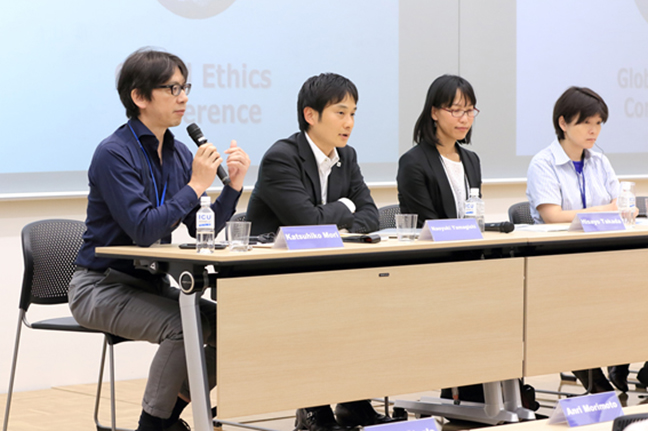
Photo: ICU. ICU's Katsuhiko Mori with Kanna Mitsuta, Hisayo Takada, and Naoyuki Yamagishi at Global Ethics Conference.
Katsuhiko Mori, Professor, International Christian University and Carnegie Council Global Ethics Fellow:
The accident is local, but the problem is global.
The March 2011, Tohoku earthquake, tsunami, and Fukushima nuclear disaster in Japan, like Chernobyl before it, brought into sharp relief the ethical issues that surround the management of technological risk and the fragility of nuclear power plants. As a result, Japan represents a projector lens through which to explore how society can move beyond the nuclear age. In so doing, it is extremely important for ethical inquiries to engage with local communities with firsthand experience of the triple disaster. The accident is local, but the problem is global.
The Bridge for Fukushima, the local partner for the site visits in Fukushima, has been collecting knowledge and information on the local community's disaster responses and has been organizing learning tours and training seminars for both Japanese and international participants. Among a variety of activities, the learning seminar using "March 11, 2011: Namie Township," a decision-forcing case study material developed by Learning Initiative Inc., based on the archival data at Namie Township, has a great potential for educational and training resources on the ethical dilemmas faced by the local town officers.
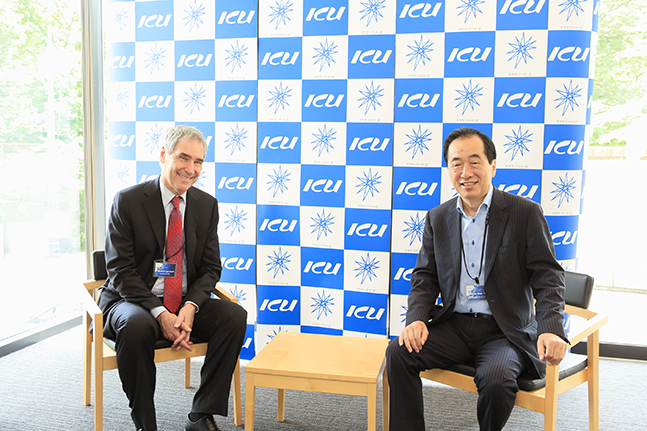
Photo: ICU. Michael Ignatieff and former Prime Minister of Japan Naoto Kan at the International Christian University Conference.
With the support of the Japan ICU Foundation and the Robert J. Myers Fellows Fund from the Carnegie Council for Ethics in International Affairs, we visited the actual sites that appear on the case material, and had dialogues with the local people in the disaster affected community. We also had a learning seminar with the case material translated from Japanese into English at a community center, which was formerly used as an evacuation site. To bridge the gap between global ethical inquires and local experiences, local voices must be listened to and local reality must be learned.
Holly Myers, RJ Myers Fellows Fund:
The case history of the struggle faced by the residents of Namie township as they cope with the 'triple disaster' of the March 2011 earthquake, tsunami and Fukushima Daiichi nuclear plant catastrophe should be required reading for officials and citizens alike, as they contemplate the difficulties, strain and building tension of dealing with dire and prolonged emergencies. This dramatic narrative develops our empathy and strengthens our resolve—and reminds us that while it is impossible to truly anticipate and 'prepare' for disaster, it is critical to focus attention and resources—and try.
Malka Older, Senior Fellow, Carnegie Council:
Technology suffuses all aspects of our societies, both in its benefits—like the electricity that Fukushima Daiichi provided not only to Japanese consumers, but to manufacturers whose products were exported across the globe—and in its risks—like the nuclear meltdown of that plant, which forced tens of thousands to leave their homes and raised fears worldwide. One this recent trip to Japan, the Carnegie Council for Ethics in International Affairs explored the implications of technology and risk by engaging in discussions across a range of different sectors of society. We spoke not only with government officials and politicians but also with students and professors, farmers and police officers, Japanese and foreigners, leaders of large companies, journalists, and activists. Having the opportunity to interact, in depth, with so many stakeholders demonstrated powerfully the multiple, interacting impacts of the disaster, as well as the potential for resilience.


